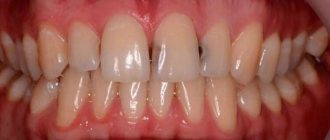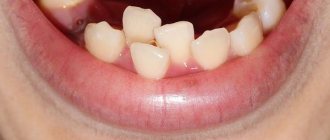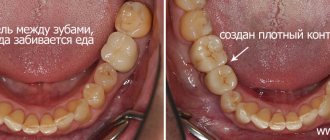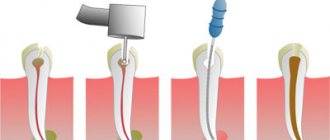Toothache has its own properties and characteristics. Based on how exactly the tooth hurts, the dentist can make a diagnosis and carry out treatment. For example, acute sudden pain radiating to the jaw or temple most often indicates inflammation of the nerve of the tooth - pulpitis. Aching periodic pains that subside on their own indicate a chronic process, possibly periodontitis, etc.
Tooth sensitivity when pressed can be caused by several diseases.
— 15% on the first visit
Pulpitis
Inflammation of the neurovascular bundle of the tooth is one of the most common diagnoses with which patients come to the dentist. Most often, pulpitis occurs due to untreated caries, which destroys the hard tissues of the tooth and reaches its core. As already mentioned, pulpal pain when pressed is very sharp, they are characterized as a “lumbago”. Nerve endings give the most severe symptoms, so it is very difficult to tolerate this phenomenon. You should not rely only on painkillers. It is better to consult a dentist to get timely help for your tooth.
Treatment of gum pain
It is important to treat gum disease as soon as possible. Any, even the most harmless pathology, can turn into periostitis with high fever, swelling of the mucous membranes and loose teeth. Moreover, inflammation in the gums releases toxins that provoke the development of blood poisoning.
You should not discount the possibility of pain in the gums when pressing due to illiterate treatment by a dentist. Normally, pain after treatment persists for 1-2 weeks. If the pain continues longer and does not subside, it is important to see a doctor as soon as possible. It happens that after poor-quality dental canal filling, bacteria appear in the voids, which provoke an infectious process.
The dentist may also leave the edges of the filling uneven, causing damage to the gums. In this case, you should definitely consult a doctor so that he can improve his work.
Attacks of pain when pressing on the gums are also common with increased sensitivity of the teeth and gums. However, with proper care, this pain goes away quite quickly. When it occurs, you should use toothpastes and rinses for sensitive teeth.
For example, ASEPTA Sensitive preventive toothpaste allows you to perform oral hygiene without irritating sensitive gums. The combination of 3 desensitizing components - potassium citrate, hydroxyapatite, thermal mud - significantly reduces the sensitivity of teeth and gums.
For more effective prevention of pain in the oral cavity, it is recommended to use ASEPTA gum gel with propolis. In this product, propolis is produced in the form of a gel, which makes it easy to apply to the gums. Prolonged contact with the painful area of the gum allows the gel components to penetrate deeper and promotes rapid healing.
The cause of pain when pressing on the gums can also be various injuries to the gums and teeth, received, for example, when trying to crack nuts or toffee. Such injuries also need to be shown to the dentist as soon as possible, otherwise there is a possibility of an inflammatory process.
Periodontitis
Sometimes painful sensations occur in a tooth from which the nerve has already been removed. When pressed, the tooth hurts and aches. Many patients are perplexed as to how a fully treated organ can produce such symptoms. However, treatment is not always of high quality. The following mistakes may be made during canal filling:
- perforation of root canal tissues with an endodontic tip;
- incomplete cleansing of nerve tissue from the canal;
- poor quality disinfection of treated canals;
- insufficient tightness of canal sealing;
- the use of cheap fillings that can dry out over time.
All of the above reasons lead to various complications in the dental cavity. Of course, this does not happen immediately after treatment: it may take a month, and sometimes several years. However, such therapy will sooner or later make itself felt. The causing tooth will begin to ache at night, and then will react with pain to any pressure. The essence of periodontitis is the penetration of infection into the tissues of the dentoligamentous apparatus. Through the tip of the root canal, pathogenic bacteria enter the periodontium. There they slowly spread, forming cysts and granulomas of various types. Treating this type of inflammation is quite difficult and takes a long time, and a large percentage of such diseases require removal of the neglected organ.
When the first symptoms of periodontitis appear, dentists recommend following the following tips:
- If a tooth hurts when biting, it is strictly forbidden to apply heat to the sore spot;
- take one or two tablets of painkillers such as paracetamol, tempalgin, analgin;
- brush your teeth, removing food debris from the carious cavity of the affected tooth;
- rinse your mouth several times a day with a solution of potassium permanganate, soda or furatsilin;
- Do not take anti-inflammatory drugs or antibiotics without a doctor’s prescription.
In order to prevent unpleasant consequences for the health of the body, treatment of periodontitis should not be postponed and hope that the disease will disappear over time. A timely visit to the dentist will preserve not only the health of the tooth, but also the entire body, since periodontitis contributes to the emergence and spread of harmful substances. Of course, toxins will negatively affect the functioning of internal organs and a person’s well-being.
The LeaderStom network of clinics specializes in dental therapy, orthodontics and prosthetics. Our specialists try to cure even the most advanced cases of chronic pulpitis and periodontitis with maximum preservation of natural dental tissues. Treatment tactics depend on the degree of neglect. In the initial stages, the disease can be eliminated by refilling the canals. By eliminating the source of infection, dentists achieve stable remission of the tooth and restoration of periodontal tissue. If the inflammation process has covered a large area of tissue, and a purulent process has already formed near the apex of the root, then in this case either surgical intervention or removal of the diseased tooth is possible.
If pain occurs when pressing on a filled tooth
It happens that outwardly the unit looks fine (the filling is sealed, the crown has not changed its color), but, nevertheless, painful symptoms periodically make themselves felt. This situation is considered normal only in the first day after the filling is installed. Then the pain should disappear. If it persists for a long time, then something is wrong.
Most likely, an inflammatory reaction has developed. She needs to be docked. To do this, you should make an appointment with your dentist. The doctor will conduct an in-person examination, instrumental examination, and take pictures. This will allow him to understand why the pain appeared and, based on the information received, create a progressive treatment plan.
Increased pain sensitivity immediately after treatment
If you recently visited the dentist, and the causative tooth hurts when pressed, then you should not get upset right away. In most cases, any dental intervention with a healthy tooth nerve does not leave its mark on the organ. The same situation applies to canal filling. Even with high-quality and conscientious treatment, moderate pain in the causative tooth is possible during the first two days after therapy. If a tooth hurts when pressed, and the symptom persists for a long time, then it is likely that such mistakes were made.
- Insufficient grinding of the filling. The bite line of a composite filling should not cross the boundaries of the adjacent tooth. Otherwise, the patient will feel discomfort when chewing and both teeth will be injured due to malocclusion. Fortunately, this problem can be easily fixed: you need to make another visit to the dentist and polish the surface of the filling so that it does not interfere with normal chewing.
- Broken tightness of the sealed area. In modern dentistry, high-quality composite materials are used that firmly adhere to the carious cavity. However, there are still “old type” clinics where cementing agents of previous generations are used. These fillings can develop microcracks, shrinkage and other issues that compromise the tightness of the sealed area. Such treatment can very soon result in complications.
- Inflammation of periodontal tissue can also lead to tooth pain. After surgery, the gums usually take a few days to heal. However, if a persistent infection (streptococci, staphylococci, fungi) gets into the gum of the causative tooth, then infection of nearby tissues is quite possible. In this case, the pain will be blurred, when it is difficult to understand which organ hurts when pressed.
There is no need to be tormented by the question: why does a tooth hurt when pressed? For this purpose, there is the LeaderStom clinic, where you will not only receive high-quality diagnostics, but also eliminate dental diseases of any complexity.
Nutrition: prevention of inflammation
If gingivitis is the cause of pain when pressing on your gums, it is important to review your diet by including healthy foods in your diet. To prevent future diseases, first of all, you need to consume plenty of fresh fruits and vegetables:
- Apples and pears contain a lot of pectin, which helps accelerate tissue regeneration.
- Citrus fruits are a real storehouse of vitamin C, which also helps reduce bleeding and inflammation.
- Black currants, blackberries, and raspberries contain a large amount of minerals and vitamins that increase the body's resistance.
- Carrots, cabbage and zucchini are valuable fiber and vitamins that enhance metabolic processes in the body and accelerate tissue regeneration.
To prevent gum inflammation, professional teeth cleaning is also recommended. The procedure is carried out by a dentist and allows you to eliminate all accumulated deposits and tartar.
So, now you know the most common causes of pain in the gums when pressing. Remember: when your gums or teeth bother you, you should never put off visiting the dentist. The sooner the doctor determines the cause of the problem and begins treatment, the greater your chances of saving your teeth, gums and avoiding possible complications.
Sources:
- The role of anti-inflammatory rinse in the treatment of periodontal diseases (L.Yu. Orekhova, A.A. Leontyev, S.B. Ulitovsky) L.Yu. OREKHOVA, Doctor of Medical Sciences, Prof., Head of Department; A.A. LEONTIEV, dentist; S.B. ULITOVSKY, Doctor of Medical Sciences, Prof. Department of Therapeutic Dentistry of St. Petersburg State Medical University named after. acad. I. P. Pavlova
- Clinical studies of antisensitive toothpaste “Asepta Sensitive” (A.A. Leontyev, O.V. Kalinina, S.B. Ulitovsky) A.A. LEONTIEV, dentist O.V. KALININA, dentist S.B. ULITOVSKY, Doctor of Medical Sciences, Prof. Department of Therapeutic Dentistry, St. Petersburg State Medical University named after. acad. I.P. Pavlova
- The effectiveness of the use of Asept “adhesive balm” and Asept “gel with propolis” in the treatment of chronic generalized periodontitis and gingivitis in the acute stage (Municipal Dental Clinic No. 4, Bryansk, Kaminskaya T. M. Head of the therapeutic department Kaminskaya Tatyana Mikhailovna MUZ City Dental Clinic No. 4, Bryansk
Choosing treatment tactics for food stuck between teeth
At the consultation, orthopedic dentist S.V. Zukor discovered that between the chewing teeth on the lower jaw there is a gap where food gets clogged. Due to food getting stuck between the teeth, the gums are constantly pressed, and the use of various improvised means for picking between the teeth injures the gums even more, so the gums hurt. The teeth have crowns that do not have the correct shape, there is no close contact between the teeth, and the chewing surfaces are almost flat.
To eliminate food getting between the teeth, the dentist suggested replacing the old crowns and making new ones with tight contact so that there is no gap between the teeth.
How to remove food if it's stuck between teeth
If food gets stuck between your teeth and your breath smells, you need to use hygiene products to care for your teeth.
The most common cleaning methods:
- The toothpick should be positioned at an angle of 30-40 degrees relative to the gum, pressed against the gingival papilla and the plane of the tooth. Remains of food are removed by moving the toothpick upward.
- Dental floss. The floss is pinched with your fingers and inserted into the interdental space. Cleaning with dental floss is carried out in a reciprocating motion.
It is important to understand here that both of these methods are quite traumatic, and any careless movement can damage the gums. Then how to remove food stuck between teeth? To do this, you can use an irrigator.
Irrigators are absolutely safe to use: pieces of stuck food are removed with a stream of water. This allows you to efficiently clean even hard-to-reach places without damaging the gums and interdental spaces. In addition, irrigators are ideal for the care of denture structures.
The result of replacing crowns is that food does not get stuck between the teeth
Tight contacts between teeth ensure that food does not get stuck and gums remain healthy.
The cost of ceramic crowns is 55,000 rubles per unit.
Of course, it is possible to make dental crowns cheaper (cheaper material, lack of computer modeling, etc.), but this will invariably affect the quality. The use of computer technology makes it possible to more carefully work out the shape of the crowns, provides additional convenience when taking impressions - all this is reflected in the price, so good dental crowns cannot be cheap. In addition, Dial-Dent uses the highest quality and most modern materials both for the crowns themselves and for their fixation, which increases the service life of dental restorations.
Video about how teeth are scanned with an intraoral scanner:
How to relieve pain before visiting the dentist
If the tooth begins to ache, and a pulsation appears in the gums, you need to urgently run to the doctor. But toothache can strike at the most inopportune moment, so you need to know how to quickly relieve the symptom, at least until you visit a specialist. Below are detailed recommendations in this regard.
Pharmacy painkillers
Painkillers should be selected based on the characteristics of the pain syndrome, in particular its severity. For moderate pain, drugs from the category of non-steroidal anti-inflammatory drugs are recommended, including Aspirin and Paracetamol - one tablet will help alleviate the condition for just a couple of hours. If the discomfort intensifies in the evening, you can additionally take an antispasmodic, for example, “No-shpu” or “Spazmaton”. And remember: before taking any medications, it is better to consult your doctor in advance, at least by phone.
Pharmacy painkillers will help relieve pain
If the pain is too severe, and there is also pronounced pulsation in the gums, ordinary painkillers cannot be used. You will have to resort to stronger drugs, which include Ketorolac, Nise and Nimesulide. Here you need to clearly understand that painkillers only mask the problem, but do not solve it. If you feel much better after taking the pill, this does not mean that the pain will not return. The only solution to the problem is treatment under the close supervision of a dentist.
Traditional medicine tips
You can relieve swelling and muffle inflammation using traditional medicine. However, here it is also important to approach everything wisely - it is better to consult your doctor once again before using “grandmother’s” recipes. Here are some proven recommendations:
- rinsing with soda-salt solution: dissolve 2 g of soda and salt in a glass of warm water. Rinse your mouth after eating and every 15 minutes if the pain is too severe,
- propolis: chewing a small piece of propolis leads to slight numbness of the soft tissues, thereby reducing pain,
- decoctions of medicinal herbs: a teaspoon of dried and crushed plant is poured with 200 ml of boiling water and left for several hours. After this, filter and use for rinsing the mouth. The recipe is suitable for plants such as chamomile, sage and oak bark,
Chamomile infusion is great for rinsing - cold compress: to relieve pain and swelling, you can apply a cold compress to your cheek,
- essential oils: a piece of cotton wool soaked in eucalyptus or clove oil is applied to the causative tooth.
After acute manifestations of inflammatory processes have been eliminated, it is necessary to see a doctor as quickly as possible. If you put off going to a specialist for too long, saving yourself only with pharmaceutical painkillers, you can easily bring the situation to a critical limit, and then the question of possible tooth loss will arise.
- Grechishnikov V.V. Complex treatment of chronic destructive periodontitis of human teeth, 2001.











